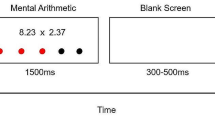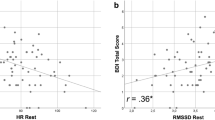Abstract
Forty-eight male subjects with no previous meditative experience engaged in either progressive relaxation (PR), a meditative treatment designed to induce the relaxation response (RR), or a no-treatment control experience (C) during four sessions on consecutive days. Negative expectations regarding the effectiveness of each technique for reducing physiological responses to stress were induced for half of the subjects in each treatment condition, and positive expectations were induced for the other half. Subjects viewed a stressful film following practice of their technique during the first and fourth sessions. Heart rate and electrodermal responding were recorded continuously during practice of the techniques and during the stressful film throughout the first and fourth sessions. Results indicated lowered heart rate levels prior to the film for subjects in the PR-positive expectancy condition and during the film for subjects in the RR-positive expectancy condition. It is suggested that subjects' expectancies concerning meditation may affect cardiovascular responding during stress, although meditative treatments in general do not appear to reduce stress responding as effectively as previously suggested.
Similar content being viewed by others
References
Beary, J. F., & Benson, H. A simple psychophysiologic technique which elicits the hypometabolic changes of the relaxation response.Psychosomatic Medicine 1974,36 115–120.
Benson, H.The relaxation response. New York: William Morrow, 1975.
Borkovec, T. D. The effects of expectancy on the outcome of systematic desensitization treatments for analogy anxiety.Behavior Therapy 1972,3 29–40.
Borkovec, T. D. The role of expectancy and physiological feedback in fear research: A review with special reference to subject characteristics.Behavior Therapy 1973,4 491–505.
Boudreau, L. Transcendental meditation and yoga as reciprocal inhibitors.Journal of Behavior Therapy and Experimental Psychiatry 1972,3 97–98.
Daniels, L. K. The treatment of psychophysiological disorders and severe anxiety by behavior therapy, hypnosis, and transcendental meditation.American Journal of Clinical Hypnosis 1975,17 267–270.
Davidson, R. J., Goleman, D. J., & Schwartz, G. E. Attentional and affective concomitants of meditation: A cross-sectional study.Journal of Abnormal Psychology 1976,86 235–238.
Eysenck, H., & Eysenck, S. B.Manual for the Eysenck Personality Inventory. San Diego: Educational and Testing Service, 1968.
Folkins, C. H., Lawson, K. D., Opton, E. W., & Lazarus, R. J. Densensitization and the experimental reduction of threat.Journal of Abnormal Psychology 1968,73 100–113.
Gatchel, J. R., & Proctor, J. D. Effectiveness of voluntary heart rate control in reducing speech anxiety.Journal of Consulting and Clinical Psychology 1976,44 381–389.
Glueck, B. C., & Stroebel, C. F. Biofeedback and meditation in the treatment of psychiatric illness.Comprehensive Psychiatry 1975,16 314–324.
Goldman, B. L., Domitor, P. J., & Murray, E. J. Effects of Zen meditation on anxiety reduction and perceptual functioning.Journal of Consulting and Clinical Psychology 1979,47 551–556.
Goleman, D. J., & Schwartz, G. E. Meditation as an intervention in stress reactivity.Journal of Consulting and Clinical Psychology 1976,44 456–466.
Hjelle, L. A. Transcendental meditation and psychological health. In D. P. Kannellakos & P. C. Fergason (Eds.),The psychobiology of transcendental meditation. Los Angeles: MIU Press, 1973. (Abstract)
Lazarus, R. S. A laboratory approach to the dynamics of psychological stress.American Psychologist 1964,19 400–411.
McReynolds, W. T., Barnes, A. R., Brooks, S., & Rehagen, N. J. The role of attention-placebo influences in the efficacy of systematic desensitization.Journal of Consulting and Clinical Psychology 1973,41 86–92.
Paul, G. L., & Trimble, R. W. Recorded vs. “live” relaxation training and hypnotic suggestions: Comparative effectiveness for reducing physiological arousal and inhibiting stress response.Behavior Therapy 1970,1 285–302.
Pelletier, D. Influence of transcendental meditation upon autokinetic perception.Perceptual and Motor Skills 1974,39 1031–1034.
Smith, J. C. Meditation as psychotherapy: A review of the literature.Psychological Bulletin 1975,82 558–564.
Smith, J. C. Psychotherapeutic effects of transcendental meditation with controls for expectancy of relief and daily sitting.Journal of Consulting and Clinical Psychology 1976,44 630–637.
Spielberger, C. D., Gorsuch, R. L., & Lushene, R. E.STAI manual. Palo Alto, California: Consulting Psychologists Press, 1970.
Stern, J. A., Surphlis, W., & Koff, E. Electrodermal responsiveness as related to psychiatric diagnosis and prognosis.Psychophysiology 1965,2 51–61.
Vahia, N. S., Doongaji, D. R., Jeste, D. V., Kapoor, S. N., Ardhapurkar, I., & Ravindranath, S. Further experience with the therapy based upon concepts of Patanjoli in the treatment of psychiatric disorders.Indian Journal of Psychiatry 1973,15 32–37.
Wallace, R. K., & Benson, H. The physiology of meditation.Scientific American 1972,226 84–90.
Wolpe, J., & Lazarus, A. A.Behavior therapy techniques: A guide to the treatment of neuroses. New York: Pergamon Press, 1966.
Woolfolk, R. L. psychophysiological correlates of meditation.Archiveds of General Psychiatry 1975, 32,1326–1333.
Woolfolk, R. L. Psychophysiological correlates of meditation.Archives of General Psychiatry 1975,32 1326–1333.
Zuckerman, M. The development of an affect adjective check list for the measurement of anxiety.Journal of Consulting Psychology 1960,24 457–462.
Author information
Authors and Affiliations
Additional information
This research is based upon a master's thesis submitted by the first author to the graduate school at Northern Illinois University. The research was supported in part by a grant to the second author from the graduate school at Northern Illinois University. Portions of the article were presented at the convention of the Midwestern Psychological Association in Chicago, 1978.
Rights and permissions
About this article
Cite this article
Bradley, B.W., McCanne, T.R. Autonomic responses to stress. Biofeedback and Self-Regulation 6, 235–251 (1981). https://doi.org/10.1007/BF00998872
Received:
Issue Date:
DOI: https://doi.org/10.1007/BF00998872




